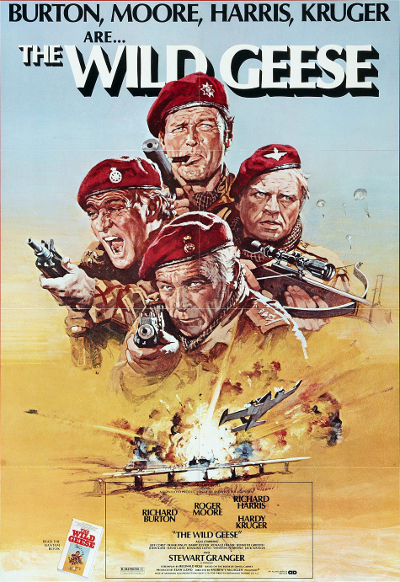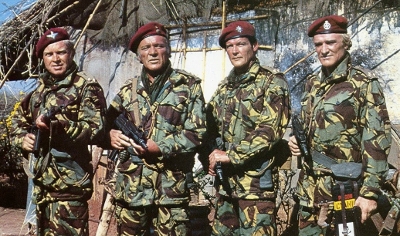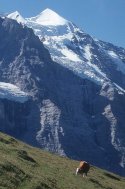|
Moore Not Less - The Wild Geese

The Wild Geese is the first and
best known of the films that Roger Moore made with director Andrew V
McLaglen and was based on a novel called The Thin White Line by Daniel
Carney. McLaglen had directed some lesser John Wayne westerns and was
chosen when John Ford put in a good word for him with producer Euan
Lloyd. Lloyd had resisted the suggestion by the studio that Michael
Winner direct the film.
The Wild Geese is an all star
war adventure film and fulfilled Lloyd's ambition to make a Dirty Dozen
style caper with many famous names in the cast. Burt Lancaster was set
to star at one point but when he made one too many demands about his
character and his fee he was replaced by Richard Harris. According to
Roger, OJ Simpson was lined up to play his own part before he was cast!
The film was made in South
Africa and so there were demonstrations by anti-apartheid campaigners
when it was released. In mitigation, the producers highlighted the
positive response the film had received when it was shown in Soweto and
the subplot where Hardy Krüger's bigoted white South African mercenary
comes to respect the deposed black African leader he has to protect.
Well, fair enough but there is no way to completely get around the fact
that the villains to be mowed down in this war film are not Hitler's
Nazis but black Africans.
James Bond connections? Future
Bond director John Glen edits while Syd Cain handles the production
design. Maurice Binder supplied the very Bondesque titles for The Wild
Geese.
The premise for the film has
retired soldier Colonel Faulkner (Richard Burton) hired by dodgy but
stinking rich banker Sir Edward Matherson (Stewart Granger) to spring
an African leader named Limbani (Winston Ntshona) who has been deposed
in a military coup d'etat. Limbani is a prisoner of dictator General
Ndofa and Matherson wants to implement a little regime change.
Faulkner doesn't completely
trust Matherson but he needs the money and so begins to put together a
team of veteran mercenaries capable of executing this dangerous
mission. Chief amongst them are two old friends and colleagues - master
tactician Captain Rafer Janders (Richard Harris) and ace pilot
Lieutenant Shawn Fynn (Roger). Once in place, the mercenary team are
put through their paces in training camp by veteran drill sergeant
Sandy Young (Jack Watson).
When Faulkner and his men arrive
in the Central African nation of Zembala they accomplish their mission
and rescue the ailing President Limbani but the plane that is supposed
to fly the mercenaries to safety takes off without them. Matherson has
done a deal with General Ndofa for mining rights and double-crossed
Faulkner. The mercs are (ahem) expendable in this heartless mélange of
war, politics and greed. With the seriously ill Limbani in tow, the
mercenaries are trapped in hostile jungle with Ndofa's army out to kill
or capture them. Can Faulkner and his men fight their way to safety and
escape?
While Roger's other war pictures
tend to come off as Sunday afternoon fare, The Wild Geese has a harder
edge (with swearing and whatnot) and is at times a rather violent boy's
own action adventure. The lead actor and real star of the film is
Richard Burton as Faulkner. Burton plays it straight and gives Faulkner
a believable sense of quiet charismatic authority. You believe this man
was a respected officer to these men and that they would still follow
him into battle even though they've all retired from any official army.
If this isn't a contradiction, Burton makes Faulkner both decent and
ruthless. You could trust him to watch over your family but woe betide
anyone who tries to double cross him. So what if Burton seems a little
bored at times. He's still Richard Burton.
The easy chemistry between the
three main stars is advantageous to the film and Roger manages to hold
his own against the heavyweight duo of Burton and Harris. It is
sometimes said that Roger should have played Bond the way he did Shawn
Fynn. Much of this I suspect comes from a scene early on when Fynn,
while working as a currency smuggler, forces a drug dealer to eat his
own drugs. It's a pretty nasty scene and displays Roger in a much more
cold and ruthless light than James Bond (save perhaps for the car
kicking moment in For Your Eyes Only). But Roger is not entirely
convincing dispensing some rough justice to drug pushers. His main
strengths lay in light comedy and being debonair.
The Wild Geese is a more violent
and straight up actioner than Bond but - the drug pusher scene aside -
Roger's 007 and his cigar chomping mercenary Fynn are not a million
miles apart and fairly interchangable if you take away the beret and
army uniform. He's on good form in The Wild Geese as the pilot who can
fly anything and seems to be enjoying interacting with this cast.
Seventies fashion alert: Roger's checked cap is quite extraordinary.

The first portion of the film
has a familiar structure for anyone who has watched these types of
films. Faulkner must assemble his team and put them through their paces
for the mission. It's enjoyable enough and has a certain authenticity
too. Jack Watson is perhaps typecast here but believable as the tough
Sergeant Major bored to tears tending to his garden in civvy street and
delighted when Faulkner knocks on his door (although his wife is not so
thrilled) to ask him to train the mercenaries.
Hardy Krüger is decent enough as
the South African merc Coetzee although his exchanges with Winston
Ntshona's Limbani about apartheid and the future of Africa grow rather
tiresome in the end. The Wild Geese is not a racist film (the heart of
the plot is essentially about European exploitation of Africa) but
it's a trifle lumbering and heavy-handed at times handling the message
of reconciliation. Roy Budd's score is not one of his best but the
martial and orchestral cues are serviceable enough. What does date the
film more is Joan Armatrading's theme song.
A host of familiar faces grace
the film. Ronald Fraser as McTaggart and Kenneth Griffith as the gay
Medic Witty. The Witty character seems hopelessly dated now. It's like
Jimmy Logan in Carry On Girls being one of Arnie's soldiers in
Predator. I'm sure there were plenty of gay servicemen through the ages
who didn't mince around like Mr Humphries. Griffith makes the most of
his last scene though and is at least depicted as competent and brave.
Stewart Granger is enjoyably
smarmy as the villain who sets the plot in motion while Frank Finlay
(shades of Zulu) turns up as a a nutty character named Father
Geoghegen. "Good luck to you, you Godless murderers!" Burton and Harris
apparently agreed to stay sober during the shoot as part of their
contracts but Finlay looks like he's had a few. The familiar voice of
Patrick Allen is here too as Rushton and look out for Barry Foster as
Granger's assistant.
Richard Harris is always very
watchable as Janders and has a believable onscreen friendship with
Burton's character. They feature in the most famous scene in the film
together near the end. And yes, the child actor who plays Janders' son
Emile is rather wooden.
The action is pretty good when
it arrives although a few more pyrotechnics wouldn't have gone amiss.
The team's extraction of Limbani is entertaining and rather devious in
execution at times - certainly more believable than popcorn rescues in
shoot 'em ups like Predator and The Expendables. And when the **** hits
the fan and Faulkner and his men are left to fend for themselves there
is a real sense of danger and peril - aided by the fact that characters
are killed off left, right and centre.
The Wild Geese is certainly
dated in places, not completely devoid of political incorrectness (this
is the seventies lest we forget), and may be predictable at times but
the stars lend good performances and there is even a poignant last
scene. There are some better war films out there but The Wild Geese is
still solid late night entertainment.
- Jake
c 2015
Alternative 007
|

|


